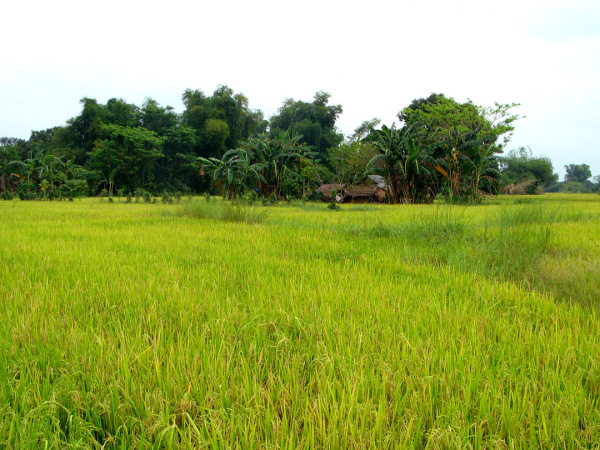Filipino Farmers Share ‘Seeds of Hope’
Human Wrongs Watch
By Wilhelmina Pelegrina*, 19 December 2014 — Ecological farmers in the Philippines have pooled their expertise and resources and travelled close to 600 km (370 miles) to help farmers in Dolores, Eastern Samar, get back on their feet following Typhoon Hagupit.

Credit: Jimmy Domingo/Greenpeace
Communities were hardest hit in Dolores, where Hagupit (local name ‘Ruby’) first made landfall on 6 December and ripped through the region leaving a trail of damaged homes and devastated fields.
Local authorities there say that none of the region’s farmland escaped the storm’s ferocious onslaught, with rice and corn crops being the most severely affected. For the country as a whole, the damage to agriculture is estimated at PHP1.9 billion (US$42.5 million).
Despite the prompt assistance that relief operations provided to the local population, local farmers were left with a big challenge: how to obtain seeds to replant their devastated fields.
Farmers from Cebu, Bohol and Negros came to the rescue with rice seeds, root crops, vegetable seeds and organic fertilisers destined for 125 of those hardest-hit in Dolores.

Photo: Greenpeace
Greenpeace Philippines was also pleased to help. We sourced organic seeds and fertilisers, consulted with officials in Dolores in designing a distribution programme and mobilised groups to help with packing and moving the seeds.
Deliveries started a few days ago, with some farmers travelling close to 600 kilometres by sea and land to reach Dolores.

Credit: Victor Kintanar/Greenpeace
The consignment of agricultural aid was the first delivery of seeds since the typhoon hit the area. It will be crucial in helping local farmers recover and in ensuring food supplies once emergency food distribution ends.
It is a touching gesture of solidarity that embodies the Filipino spirit of ‘bayanihan’ and the sharing of blessings during this Christmas season. The seed mission, called ‘Balaynihan’, is a combination of two words: Balay (house), and Bayanihan(communal unity and co-operation).
This farmer-powered initiative is more than a heart-warming story – it can also have a powerful and longer-lasting local impact than food hand-outs.
That’s because the farmers who travelled to Dolores are experts in ecological farming. Their assistance goes beyond simply delivering seeds; they are also sharing their knowledge, experiences and best practices and have started to train their local counterparts in cultivating climate-resilient crops based on ecological farming practices.
The initiative shows how farmers can respond to each others’ needs, if only there is a support mechanism available.
Following the latest typhoon, this has been sorely needed. In theory, the Philippines government runs a community seed bank programme to help communities maintain buffer stocks of seeds in the event of calamities. In reality, the programme exists only on paper.
A farmer-to-farmer response mechanism is logical and needs support as the bulk of rice seeds is still held by the farmers themselves. In times of crisis, they are the main source of seeds.

Credit: Charlie Saceda/Greenpeace
A secure local seed system, made possible by strengthening and supporting farmers’ seed conservation and improvement work, combined with ecological farming are the cornerstones of a resilient agriculture and food system.
Ecological farming is an agricultural system that can provide greater resilience to climate shocks such as droughts or typhoons. It relies on the diversity of nature to help the soil retain more water and stay healthier to retain nutrients for crops in times of extreme weather. Ecological farming also encourages crop diversity as a whole.

Credit: Andi-Tambunan/Greenpeace
With the Philippines once again bearing the brunt of a severe typhoon, ensuring a resilient farming system is essential. Climate-resilient ecological farming deserves greater support from governments, philanthropies and foreign donors. They should abandon industrial and chemical-intensive agriculture, which is a system incapable of withstanding climate shocks.
You can show you support farmer-based initiatives and ecological farming by sharing this story on social media. Together, let’s grow and cultivate an ecological food and farming movement.
*Wilhelmina Pelegrina is a senior ecological farming campaigner with Greenpeace International, and is based in the Philippines. Pelegrina’s report was published by Greenpeace. Go to Original.
Filipino farmers share ‘Seeds of Hope’
-











